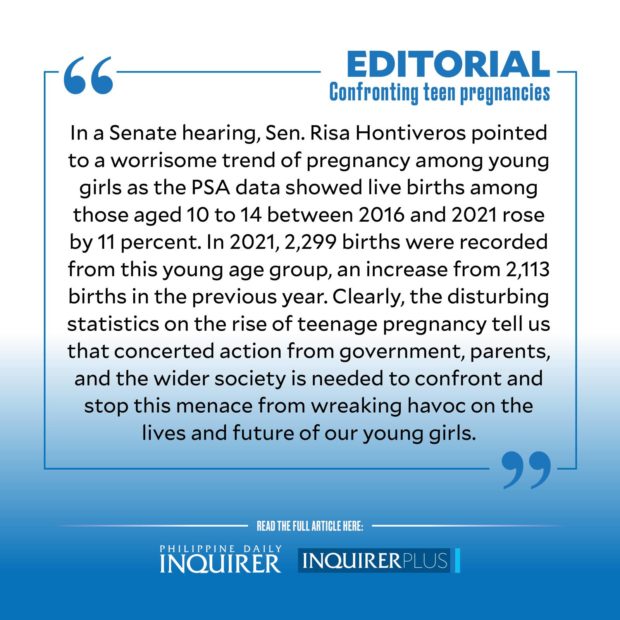Confronting teen pregnancies
American writer Ellen Goodman once wrote that talking about teenage sex “is like shouting ‘Fire!’ in a crowded theater.”
Indeed, even in this day and age, and especially in the Philippine setting, teenagers and sex is a trigger for fevered debate, moralistic diatribes, and generational denunciation.
So judgmental is our society that, in the wake of the passage of the Responsible Parenthood and Reproductive Health Act in 2012, the Supreme Court sought to intervene in the right of young people to seek reproductive health services. In amending the law, the high tribunal required adolescents seeking such services from public health providers to first show proof of parental consent and approval. As teens themselves might put it: “Fat chance!”
But as the latest report from the Philippine Statistics Authority (PSA) reveals, the problem doesn’t concern teenagers alone. In a Senate hearing, Sen. Risa Hontiveros pointed to a worrisome trend of pregnancy among young girls as the PSA data showed live births among those aged 10 to 14 between 2016 and 2021 rose by 11 percent. In 2021, 2,299 births were recorded from this young age group, an increase from 2,113 births in the previous year.
Sen. Sonny Angara, chair of the Senate youth committee, pointed to another worrying information from the PSA—that majority of the registered live births involved fathers who were much older than the mothers.
“Even more concerning was the data on fathers who were more than 10 years older than the teenage mothers, which the PSA pegged at 6 to 7 percent annually from 2016 to 2020,” Angara said.
This development should keep authorities awake at night, for this indicates that young girls are falling prey to violence and sexual abuse. This problem was known to have been exacerbated by the long pandemic lockdown, which trapped women and girls in homes with predators.
Senate President Juan Miguel Zubiri pointed out that these cases could be tantamount to statutory rape under Republic Act No. 11648 of 2022 which raised the age of sexual consent from 12 to 16.
“Rape is a heinous crime,’’ said Zubiri as he called on Justice Secretary Jesus Crispin Remulla and Philippine National Police chief Gen. Rodolfo Azurin Jr. to arrest and prosecute adult men who enter into sexual relationships with minors.
This is easier said than done. Without the girls or their families coming forward, it would be a challenge to file cases of statutory rape particularly if the men involved are family members or known to their victims. A PSA official noted that because of the privacy law, authorities could not just get information from the birth registration records to pursue possible cases of statutory rape. This is one area for possible legislation that the Senate could look into.
Prompt intervention by several government agencies is needed to prevent teenage pregnancy from becoming a bigger nightmare. The problem is multifaceted, and tied to lack of education and poverty.
As Dr. Leila Joudane, country representative of the United Nations Population Fund, said: “Teenage pregnancy is not only a health and education problem, but an economic development issue.”
The education, health, and social welfare departments have their work cut out for them. But first, they need to recognize the problem and make coordinated measures to address it. While a ticklish issue, sex education for girls—and boys—could include these eye-opening statistics and the responsibilities of early pregnancy and parenthood that adolescents and teenagers are hardly equipped to carry.
Barangays and local government units also have the resources to reach out to poor communities to help their constituents have a better awareness of the current problem and help those who might have no means or courage to seek intervention.
As this paper’s columnist Anna Cristina Tuazon pointed out, traditional awareness campaigns were centered on the assumption that this is a problem of teenagers having sex with teenagers, and thus focused on promoting abstinence or safe sex. “What we failed to address is the significant imbalance of power that teen girls experience during their first sexual encounter,” she said.
She made the important point that confronting teenage pregnancy “is the same fight as countering our patriarchal culture” and that parents, especially fathers, “should be just as strict, if not more, toward their sons, rather than just toward their daughters.”
“It is much easier to accept the responsibility of protecting our girls from becoming victims than it is to acknowledge that we have to be proactive in protecting our boys from becoming perpetrators,” Tuazon said.
Clearly, the disturbing statistics on the rise of teenage pregnancy tell us that concerted action from government, parents, and the wider society is needed to confront and stop this menace from wreaking havoc on the lives and future of our young girls.





















